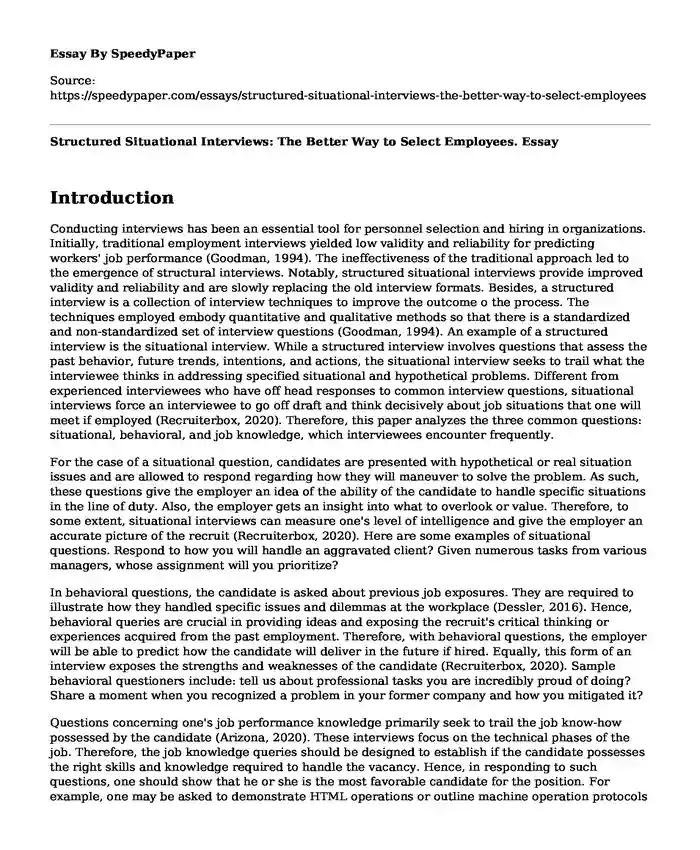
| Type of paper: | Essay |
| Categories: | Employment Job |
| Pages: | 3 |
| Wordcount: | 641 words |
Introduction
Conducting interviews has been an essential tool for personnel selection and hiring in organizations. Initially, traditional employment interviews yielded low validity and reliability for predicting workers' job performance (Goodman, 1994). The ineffectiveness of the traditional approach led to the emergence of structural interviews. Notably, structured situational interviews provide improved validity and reliability and are slowly replacing the old interview formats. Besides, a structured interview is a collection of interview techniques to improve the outcome o the process. The techniques employed embody quantitative and qualitative methods so that there is a standardized and non-standardized set of interview questions (Goodman, 1994). An example of a structured interview is the situational interview. While a structured interview involves questions that assess the past behavior, future trends, intentions, and actions, the situational interview seeks to trail what the interviewee thinks in addressing specified situational and hypothetical problems. Different from experienced interviewees who have off head responses to common interview questions, situational interviews force an interviewee to go off draft and think decisively about job situations that one will meet if employed (Recruiterbox, 2020). Therefore, this paper analyzes the three common questions: situational, behavioral, and job knowledge, which interviewees encounter frequently.
For the case of a situational question, candidates are presented with hypothetical or real situation issues and are allowed to respond regarding how they will maneuver to solve the problem. As such, these questions give the employer an idea of the ability of the candidate to handle specific situations in the line of duty. Also, the employer gets an insight into what to overlook or value. Therefore, to some extent, situational interviews can measure one's level of intelligence and give the employer an accurate picture of the recruit (Recruiterbox, 2020). Here are some examples of situational questions. Respond to how you will handle an aggravated client? Given numerous tasks from various managers, whose assignment will you prioritize?
In behavioral questions, the candidate is asked about previous job exposures. They are required to illustrate how they handled specific issues and dilemmas at the workplace (Dessler, 2016). Hence, behavioral queries are crucial in providing ideas and exposing the recruit's critical thinking or experiences acquired from the past employment. Therefore, with behavioral questions, the employer will be able to predict how the candidate will deliver in the future if hired. Equally, this form of an interview exposes the strengths and weaknesses of the candidate (Recruiterbox, 2020). Sample behavioral questioners include: tell us about professional tasks you are incredibly proud of doing? Share a moment when you recognized a problem in your former company and how you mitigated it?
Questions concerning one's job performance knowledge primarily seek to trail the job know-how possessed by the candidate (Arizona, 2020). These interviews focus on the technical phases of the job. Therefore, the job knowledge queries should be designed to establish if the candidate possesses the right skills and knowledge required to handle the vacancy. Hence, in responding to such questions, one should show that he or she is the most favorable candidate for the position. For example, one may be asked to demonstrate HTML operations or outline machine operation protocols if the job requires programming expertise.
Conclusion
In conclusion, the application of structured situational interviews is essential in the recruitment and selection of employees compared to ancient interviewing approaches. As such, behavioral and situational questions are the most effective as they relate directly to the task and role of the potential employees. These forms of interviews help to select suitable candidates for a position.
References
Arizona. (2020). Structured Behavioral Interviews. https://hr.az.gov/content/structured-behavioral-interviews
Dessler, G. (2016). A framework for human resource management. Pearson Education, India.
Goodman, D. F. (1994). The situational interview as a measure of intelligence. University of Nebraska at Omaha. https://digitalcommons.unomaha.edu/cgi/viewcontent.cgi?article=1133&context=studentwork
Recruiterbox. (2020). Asking Situational and Behavioral Questions in Job Interviews. https://recruiterbox.com/business-guides/recruiting-and-hiring/asking-situational-and-behavioral-questions-in-job-interviews
Cite this page
Structured Situational Interviews: The Better Way to Select Employees.. (2023, Jun 13). Retrieved from https://speedypaper.com/essays/structured-situational-interviews-the-better-way-to-select-employees
Request Removal
If you are the original author of this essay and no longer wish to have it published on the SpeedyPaper website, please click below to request its removal:
- Work Experience Essay Sample
- Reflective Essay Sample: Team Management
- Free Essay on Career Aspirations
- Free Essay on Profession: Data Controller for Youth Action
- Free Essay: The Long-Term Distrust Between Russia and the United States from the Last 100 Years
- Free Essay. Sales and Purchasing Management
- The Likelihood of a Potential Future Conflict Between the United States and China - Free Essay
Popular categories




